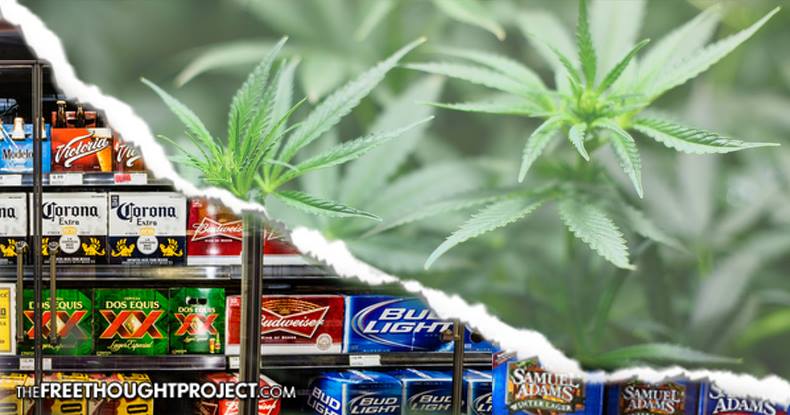Some new cannabis statistics are undoubtedly causing the alcohol industry in the US to shake in their boots.
With over half of the country’s states embracing some form of legalized marijuana, with a few states even permitting recreational use, cannabis is poised to affect the alcohol industry at some point. And according to a new study, the beer industry stands to lose billions if marijuana is legalized nationwide.
The study states, “Cannabiz Consumer Group’s (C2G) research findings predict that legal marijuana will “canna-balize” 7.1% of revenues from the existing retail beer industry.” Even though the revenue margin may seem small to some, the profit losses are predicted to exceed 2 billion dollars.
And while the research attempts to predict what will happen when and if weed is legal nationwide, many alcohol consumers are already making the switch over to marijuana. The study writes, “Twenty-seven percent (27%) of beer drinkers state that they already have substituted cannabis for beer, or would substitute their beer retail purchases with cannabis in the future if legal.”
There’s no shortage of pot smokers either. The study proclaims, “There were 24.6 million legal cannabis consumers in the US in 2016.” And while beer, wine, and, liquor sales will certainly be affected by the nationwide legalization of weed, “C2G’s projects that legal cannabis penetration will settle at a level comparable to that of beer and wine and that a fully mature market would create a new $50 billion industry.” Fifty billion dollars is nothing to shake a stick at, so to speak.
RELATED ARTICLES:
- Marijuana Research Supports Its Safety and Benefits
- Perhaps the Best Drug in Medicine, According to Stanford-Trained Doctor
“The forecasts were generated using C2G’s CannaUse™ study on the cannabis mindset and behaviors of 40K individual participants, the company’s warehouse of over 55MM cannabis purchase transactions, and CPG consumer panel and point-of-sale data sourced from IRI through an exclusive data and analytic share arrangement,” the study writes.
Socially speaking, alcohol is the most widely used drug in America, made legal after the failed war on alcohol, otherwise known as the Prohibition. Research shows that alcohol not only kills but is often found in the bloodstreams of those who’ve been convicted of crimes at the time they committed their offense. It remains, as The Free Thought Project has reported, one of the most dangerous legal drugs readily available to all Americans over the age of 21.
Maturo says the best way to compete with marijuana is to take a more accepting approach. “Those companies that are gathering insights on cannabis and have the foresight to see it as presenting an opportunity in addition to a risk will fare much better than those who strictly take a defensive position,” he said.
Knowing this information it is no wonder the alcohol industry has been caught multiple times lobbying to keep pot illegal. They are chomping at the bit to force the state to continue kidnapping and caging people who use pot as this forces everyone to be a customer of theirs.
23 states and the District of Columbia have legalized medicinal marijuana while Alaska, Colorado, Oregon, Washington, and D.C. have legalized possession and recreational use. In the years since the state legalized medicinal use, Colorado law enforcement officials have documented a significant increase in traffic fatalities in which drivers tested positive for marijuana.
Congress should fully fund Section 4008 of the FAST Act (PL 114-94) in the FY 2017 Appropriations process to document the prevalence of marijuana-impaired driving, outline impairment standards and determine driving impairment detection methods.
Also, as the Intercept reported, the fight against legalized pot is being heavily bankrolled by alcohol and pharmaceutical companies, terrified that they might lose market share.
*Article originally appeared at Free Thought Project.












